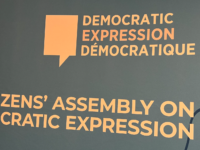Privacy breaches have become increasingly commonplace as businesses of all sizes grapple with how to keep customer information secure and what to do when things go wrong. The issue is particularly challenging for small and medium sized business, who are forced to navigate a regulatory framework that isn’t easy and can be extremely expensive. Enter JusTech, a project launched by Ritesh Kotak, Ayushi Dave, and Ryan Mosoff, three University of Ottawa law students who leveraged legal innovation hackathons to create a free online service that walks small businesses through the regulations and makes compliance manageable. I’ve been proud to serve as an advisor to JusTech, which provides some notable lessons on legal innovation and privacy law. Ritesh, Ayusha, and Ryan join the Law Bytes podcast to discuss.
Latest Posts
The Law Bytes Podcast, Episode 109: Striking the Balance on Misinformation and Freedom of Expression – My Examination of Canadian Policy Solutions
The Canadian Parliament is set to resume this week and it’s a safe bet that Internet regulation will be part of the legislative agenda in the coming months. One of the toughest policy issues involve misinformation, which can be difficult to define and potentially to regulate. The Canadian Commission on Democratic Expression was established in spring 2020 with a three-year mandate to better understand, anticipate, and respond to the effects of new digital technologies on public life and Canadian democracy. As part of its work, it created a Citizens’ Assembly comprised of Canadians from across the country who recently gathered for several days to debate disinformation online. Last week, I was honoured to deliver a dinner speech to the group followed by a facilitated discussion. This week’s podcast features a recording of that lecture with the slides posted here.
The Law Bytes Podcast, Episode 108: Scott Benzie on How Bill C-10 Ignored Canada’s Thriving Digital First Creators
The Canadian digital first creator economy isn’t something that politicians or policy makers seem to know much about, but they are quick to propose legislative reforms that directly implicate it, most recently in the form of Bill C-10. Yet the sector is thriving, with Canadian stars earning millions of dollars and attracting global audiences that often exceed Canada’s conventional film and television sector.
Scott Benzie, the CEO of Buffer Festival, started in traditional media but now advocates and works with creators, platforms and industry around online content. He joins me on the podcast to discuss the current state of digital first creators in Canada, their omission from the Bill C-10 process, and the formation of Digital First Canada, a new advocacy group to better represent the needs of the community.
The Law Bytes Podcast, Episode 107: Addison Cameron-Huff on the State of Crypto and Blockchain Regulation in Canada
From Bitcoin to NFTs, interest in crypto and the blockchain has never been greater. Millions of people around the world invest in various crypto currencies, exchanges seem to pop-up daily, and for better or worse the pace of innovation and new services is reminiscent of the early of the days of the Internet. As the industry races ahead, where does the law fit in? Can the law fit in?
Addison Cameron-Huff is a Toronto-based blockchain and cryptocurrency lawyer. A former president of Decentral, a leading Canadian blockchain company and the co-founder of Toronto Blockchain Week, his clients have included virtual currency dealers, DeFI platforms, and stablecoin developers. He joins the Law Bytes podcast to provide some insight into the state of Canadian law and regulation when it comes to this fast-moving, globally oriented sector.











